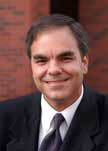News
Who's who: Dave Grano
Dave Grano will likely be viewed as one of the fathers of the retail ATM industry -- despite the fact he is just now hitting middle age. Grano, now 41, recently founded Vero, another company he hopes will make a similar impact on the financial services industry.
January 5, 2005
Dave Grano will likely be viewed as one of the fathers of the retail ATM industry -- despite the fact he is just now hitting middle age.
Grano was one of the heaviest hitters in the early years of the business. After joining seminal Portland, Ore.-based ISO Card Capture Services Inc. in 1996, he helped build CCS' ATM network to some 10,000 units, generating an annual income of nearly $120 million. He engineered its sale in 2000 to E*Trade Financial.
All before he celebrated his 40th birthday.
Grano, now 41, recently founded another company he hopes will make a similar impact on the financial services industry. Vero, a provider of automated check-cashing solutions and other services designed to reach members of the unbanked community, made its public debut at last month's Retail Delivery Conference and Expo.
 |
Dave Grano |
Despite his relative youth, Grano is a savvy businessman, said Saul Caprio, director of marketing and business development for Wincor Nixdorf in the United States. Caprio worked for Grano for four years as director of marketing at CCS.
"Dave is a natural leader and a smart businessperson who made some smart business moves," Caprio said, noting that Grano was at the forefront of the ISO business when it began to take off in the mid-'90s.
Since the sale of CCS, Grano has helped build two growing companies: Aptus Financial, another Portland ISO, and Vero.
But Grano enjoyed a successful career long before the thought of Vero or Aptus ever crossed his mind.
Movin' on up
In 1986, soon after earning a bachelor's degree in international relations from the University of Oregon in Eugene, Grano began working for Bristol-Meyers Inc.
From there, he went to work for Peat Marwick, KPMG as a business relations trainer in Japan. And in 1992, he joined US West Cellular Inc. in Bellevue, Wash., as a sales manager in the Pacific Northwest.
It was there, Grano said, that he developed his product marketing chops. "It was a great opportunity for someone right out of college."
After working with US West for nearly five years, Grano went to work for OneComm Communications, which later merged with Nextel, as general manager and director of distribution in Portland. In 1996, he was promoted to vice president and general manager of the Pacific Northwest for Nextel's PNW digital wireless network.
Yet he left Nextel for a new opportunity that seemed even more exciting -- a chance to try his hand in the burgeoning retail ATM industry.
One of Grano's fraternity brothers had started a company selling ATMs and point-of-sale terminals. The company, Card Capture Services Inc., was run by a handful of young guys who were relatively naïve about growing a business, Grano said.
In late 1996, CCS hired Grano as president and chief executive officer, positions he held until January 2001. "They were interested in taking their business from a local company to a national company, and that's why they involved me," Grano said.
Dave Grano |
Grano helped them do just that. He also helped bring the concept of screen-based and receipt advertising to the ATM world.
Working with ATM manufacturer Triton, Grano helped create a fleet of ATMs with advertising capabilities that would appeal to CCS' retail customers and help differentiate CCS from other ISOs.
"We figured out a way to advertise on the ATM screen … and we figured out how we could deliver (ad content) remotely through our headquarters," he said. "At the time, banks had been talking a lot about (selling) stamps and cards. But we determined what the highest value applications were … and the only thing we saw that was viable at the time was advertising."
In addition to his well-deserved reputation for innovation, Grano brought a likable leadership style to CCS, said Ernest Burdette, a founder and chairman emeritus of Triton.
"One of the things that's endearing about Dave is that even in midst of all of his focus and the goals he has for his organization, he gives everything he does his all. For as much as he's accomplished, the good thing about Dave is that he doesn't take himself too seriously," Burdette said.
A people person
Matt Buhler was a Phi Delta Theta brother of Grano's in college and worked with him at US West Cellular, Nextel and CCS before founding Vero with him.
Buhler, who believes he probably knows Grano better than anyone except Grano's wife, Karin, said Grano's gift is his way with people. "He's very good at leading people and supporting them and making them feel like what they're doing is appreciated and needed."
"Even if things don't necessarily go well, he's always honest with the people who work for him," agreed Karin Grano. "It's not always a happy situation … but it's always an open situation when Dave's in charge."
Buhler said it's not just that Grano creates a "good environment," but that he feels he has an obligation to others.
"There have been a lot of people who have come and gone in this industry," Buhler said. "Dave has survived because he stays balanced. … Dave's got a really good vision for the industries we've been in, and we both bring a lot of good skills to the table."
Balance and vision led Grano and Buhler to found Vero, where the two are tackling another ATM challenge -- automated check cashing and tapping into the unbanked community.
A new beginning
Before founding Vero, Grano, while still working with Aptus, started studying the challenges bankers and retailers faced in reaching the unbanked community.
In early 2000, he commissioned a study through the UCLA Anderson School of Management. The study yielded some surprises about the unbanked demographic.
"When you think about why people are unbanked, you assume that the reason … is because they don't want anyone to know who they are, or because no bank will have them," Grano said.
However, he said the study revealed that many members of the unbanked community have money-management habits not considered "traditional" by most Americans because of their cultural differences.
It isn't that the unbanked members of society don't have money; it's just that they handle their funds without putting them into bank accounts, Grano said.
"We found that getting in touch with this unbanked population would be valuable to banks," he added. "The fastest growing unbanked population is the Hispanic community, and we're finally beginning to view these people as valuable (customers)."
Family first
Finding balance also has led Grano and his company, Vero, down a slightly different path than the one followed during his tenure at CCS. Before the sale of CCS, Buhler said he and Grano worked "non-stop" for four years, "just trying to get the business off the ground."
"And then we learned that you have to have balance," Buhler said, noting that Vero is committed to making sure every employee is able to make family a priority.
Grano and his wife, whom he met at U of O and began dating 16 years ago, have three children -- a 5-year-old son and two daughters, 7 and 18 months
"My children put balance into everything," Grano said.
Giving something back
Grano also achieves balance by giving back to the community, said Evelyn Lamb, director of development for the Boys and Girls Aid Society of Oregon, a group for which Grano sits on the board of directors.
"With Dave, everything is doable … and you always come away from a meeting feeling energized," Lamb said. "He has a 50-kilo-watt smile, and when he talks about the programs for the kids, he just lights up."
For Grano, working with kids is personal. After losing his father at the age of 17, Grano was determined to carry the torch his father had lit for him.
"My dad grew up very poor," Grano said. "He'd work 12 hours a day and still have time to work with some organization for children in the community. He always gave back and he impressed upon me to do the same kinds of things in my life."
 ChatGPT
ChatGPT Grok
Grok Perplexity
Perplexity Claude
Claude












